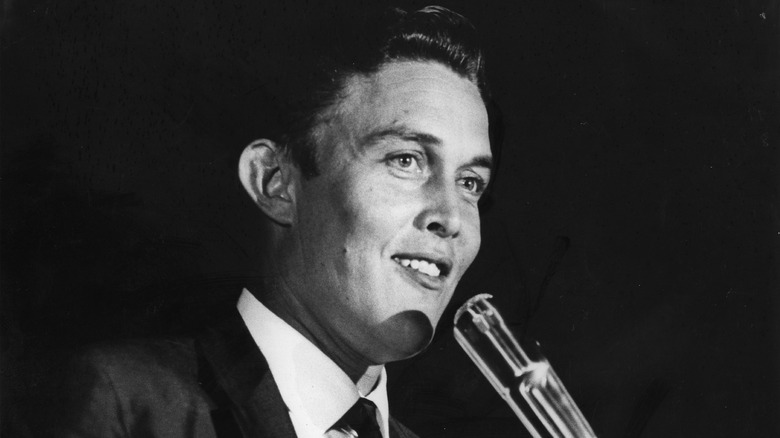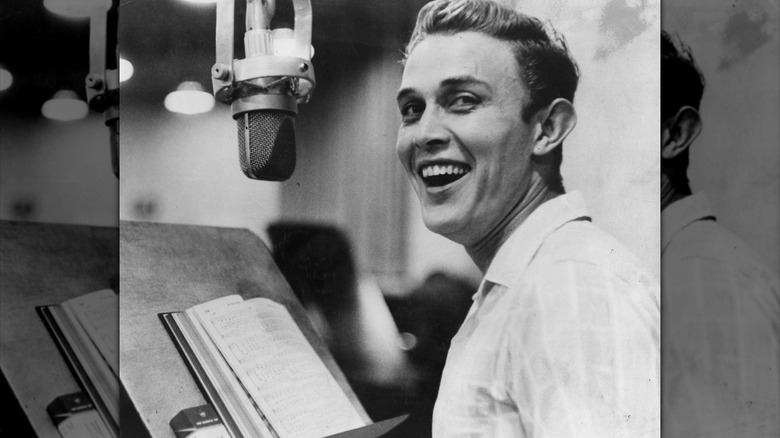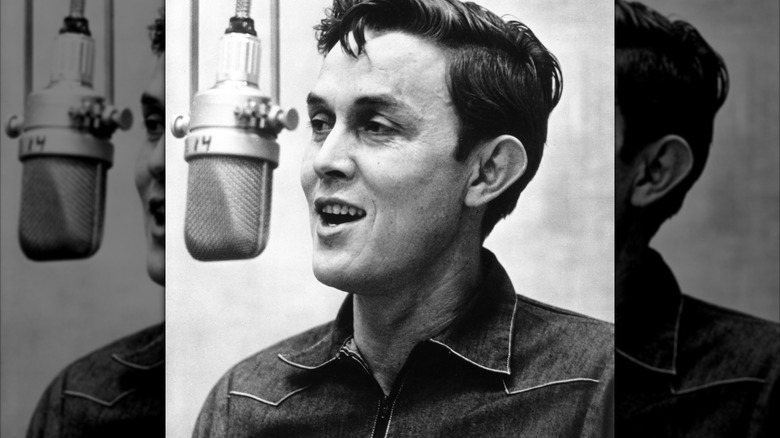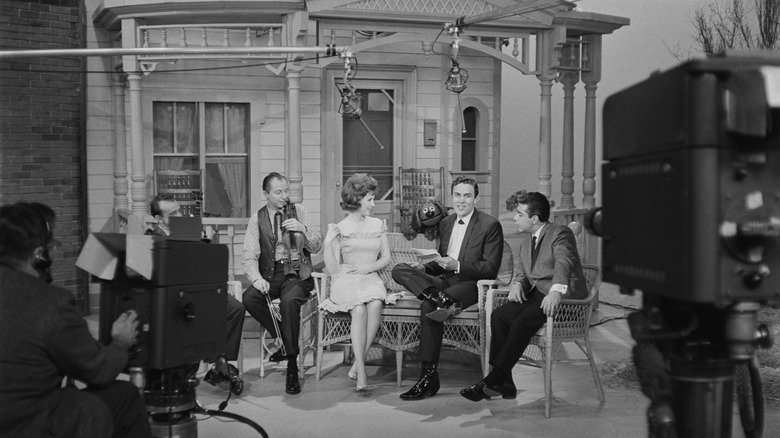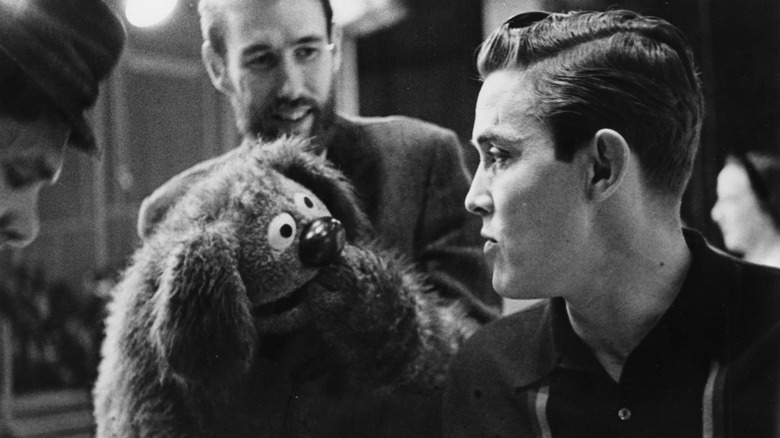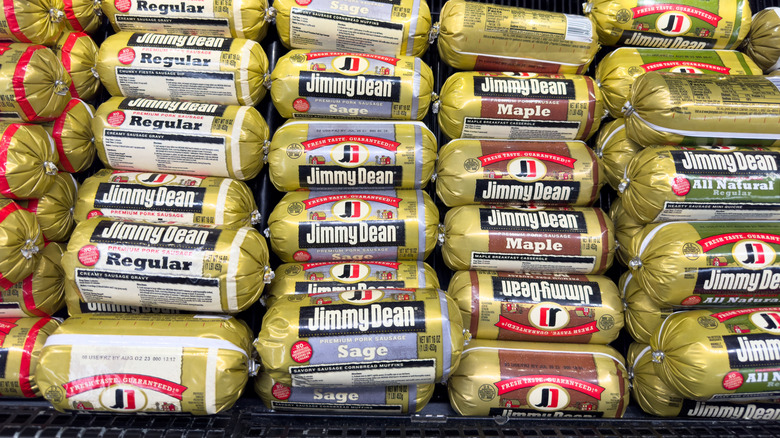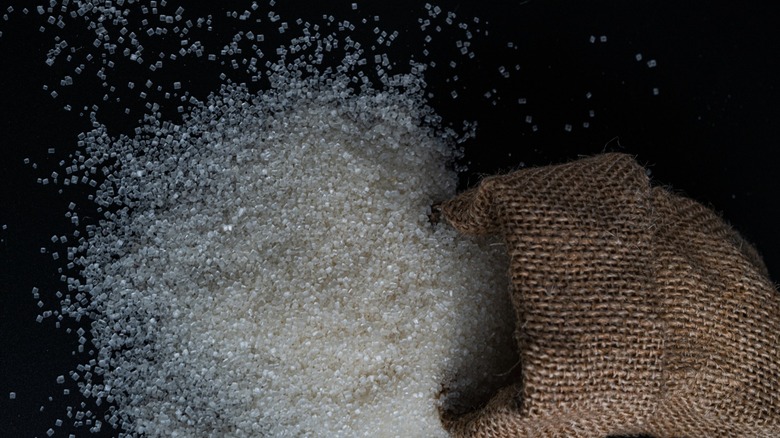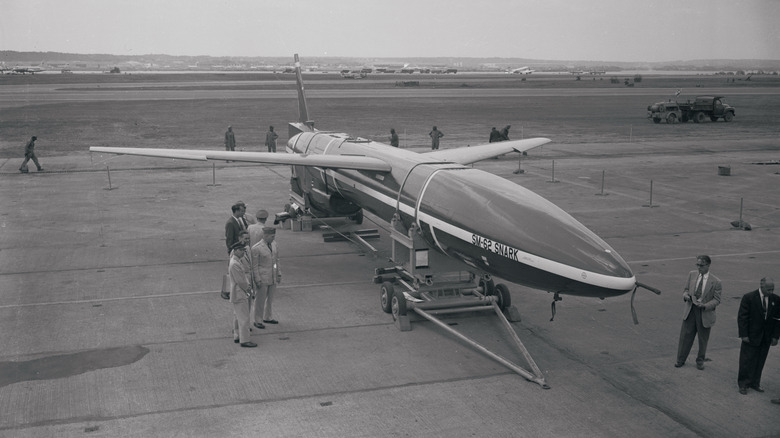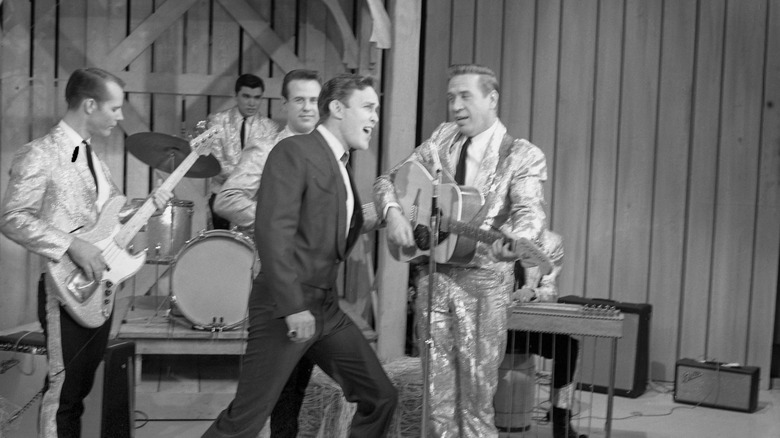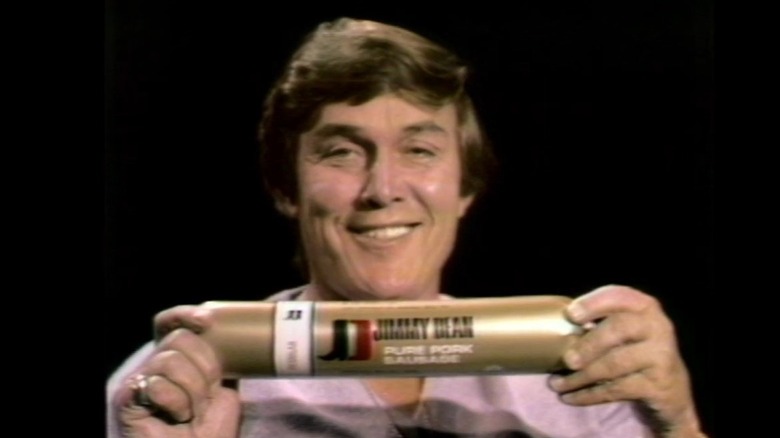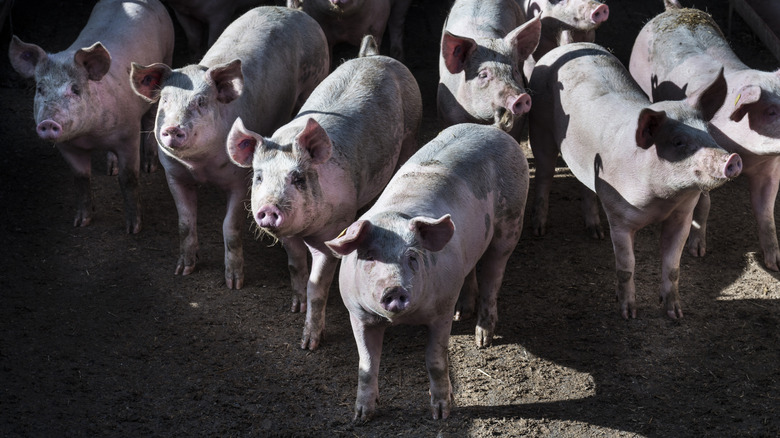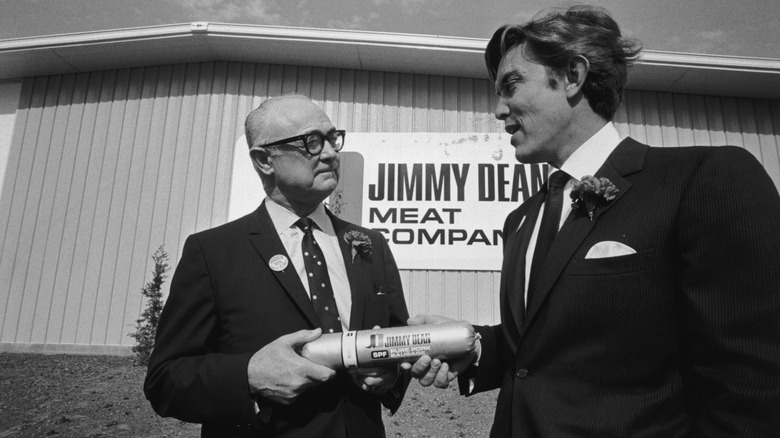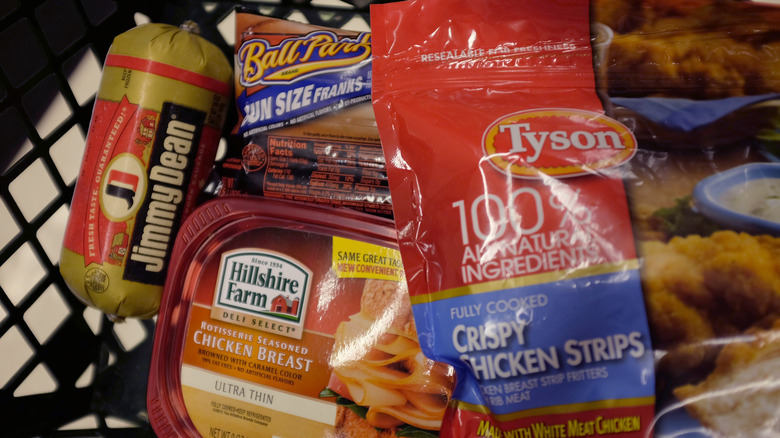Who Was Jimmy Dean And How Did He End Up Selling Sausages?
Jimmy Dean was a household name throughout the '50s and '60s. He was a television staple, and when he wasn't hosting his own shows, he appeared as a guest on other famous shows, singing his Billboard hits or composing short jingles on the fly. Everyone knew his name, songs, voice, and iconic one-liners, like "Give yourself a large chunk of that good morning feeling."
These one-liners, of course, were attached to the Jimmy Dean sausage commercials. No one else has quite the same legacy as this iconic country singer and TV show host who became equally famous for his hog farm business and premium pork sausages.
Let us look back to about 75 years ago, when television was still black-and-white, and musical entertainment was woven into the daily lives of the average American family. Who is Jimmy Ray Dean, the man credited with introducing country music singers to a wider audience through television? How did he go from composing and singing to raising hogs and making breakfast sausages? Read on to find out.
Jimmy Dean was a country music icon
Jimmy Dean composed and sang songs that were easy to listen to, especially the tracks that leaned a little towards pop. He had a clear and bright singing voice, which shows in tracks like "Little Bitty Big John". But his voice would deepen and take on a bit of a treble when he sang "Big Bad John," "The Cajun Queen," or "Dear Ivan." These songs he delivered in a melodic, spoken-word recitation style of singing. He could also be a smooth, suave crooner when he wanted to, like when he sang "Have You Ever Been Lonely," and "Little Sandy Sleighfoot."
Dean's songs were largely well-received among country and pop audiences. But even before the radio and Billboard hits, he was already making his mark on the airwaves with the Texas Wildcats, the band he formed in 1948. They would become recording artists by 1953 and continue to sing together when Dean broke into television.
Although Dean had a handful of acting credits (including a supporting role as a billionaire in Sean Connery's final James Bond film, "Diamonds Are Forever"), a much larger chunk of his television career revolved around music-centric shows, where he would sing solo or perform and square-dance with his band. With numerous achievements to his name, including performances at Carnegie Hall and the London Palladium, Jimmy Dean remains a true country music icon, still remembered by many today.
Jimmy Dean topped the Billboard Hot 100 with a song about a heroic miner
"Big Bad John" was Jimmy Dean's biggest hit, the song that became synonymous with his name even decades later. Released in September 1961, it was eventually No.1 on the Billboard Hot 100 by November 6, and held that spot for four more weeks. The song also topped the Billboard Country chart for two weeks. "Big Bad John" went on to win a Grammy for Best Country and Western Recording and was even nominated for Song of the Year. Dean released five more songs that entered the Country Top 20 the following year.
The song was memorable because of its story. It relayed the heroism of Big John, a strapping miner who stood six feet six inches tall and had an impressive physique, but kept to himself most of the time.
Big John, Dean sings, hailed from New Orleans, where he allegedly ended a man's life because of a fight over a "Cajun queen." One day, the mine where he worked collapsed, trapping him and 20 other miners. With his unusual size and strength, Big John lifted a portion of the fallen timbers and created an opening for the other men to escape through. Unfortunately, the mine collapsed fully on our hero before the men he saved could return to him, armed with tools for his rescue.
Jimmy Dean was a television show host in the 50s and 60s
In 1955, Dean and the Texas Wildcats became regulars in the afternoon program, "Town and Country Time." They also starred in the late-night Saturday show, "Town & Country Time Jamboree," which was produced by Country Music Hall of Famer Connie B. Gay. Two years later, CBS gave Dean his first hosting gig with "The Morning Show." It performed so well, the network decided to give Dean his self-titled program, "Jimmy Dean Show," which aired six days a week from 1957 to 1959.
In 1963, after releasing his chart-topping singles, Dean returned to television, this time with ABC. He hosted "The Jimmy Dean Show," which was a primetime program that showcased country music artists. It also gave legends like George Jones and Buck Owens their first big television break. The show would continue to air until 1966. In the succeeding years, the American public would continue to see Dean whenever he appeared as a guest at the "Ed Sullivan Show," "The Hollywood Palace," and "The Mike Douglas Show."
He gave Rowlf the Dog his big break, which paved the way for The Muppets
The Texas State Historical Association describes "The Jimmy Dean Show" as a "pioneering program for country variety shows." Besides country music performances, the show had comedy skits, fun dancing, and memorable guest appearances. One of the show's most beloved guests was Rowlf the Dog, a hand puppet created and originally performed by Jim Henson, the creator of The Muppets.
Jimmy Dean is notably credited for opening doors for "The Muppet Show." Initially, Rowlf the Dog was just going to appear on the first episode of Dean's show, but audiences loved him so much that they brought him (and Jim Henson) back on every episode thereafter.
For at least seven minutes every episode, Rowlf would appear onstage and engage in fun banter with Dean, talking about everything from why dogs are man's best companions to the unmentionable spot where the doctor injected penicillin when he had the flu. The two would then break into song at the end of their skit. Jimmy Dean and Rowlf became so famous that the duo reportedly received two thousand fan letters per week.
Rowlf's television fame brought more exposure to the rest of The Muppets, leading to them having their own TV show. In his biography, "Jimmy Dean's Own Story: Thirty Years of Sausage, Fifty Years of Ham," Dean revealed that Henson was so grateful, he offered him 40% ownership of The Muppets, which he declined.
After doing TV and music, Jimmy Dean became famous for selling sausages
After his TV show ended, Jimmy Dean ventured into meat production, specifically pork sausages. He took a risk by putting his name on his brand, and he won: Jimmy Dean premium sausages became a national favorite. Even in its weaker years, the company fulfilled 60 million pounds of sausages annually.
Jimmy Dean sausages are savory, nicely seasoned, and delicious whether eaten solo or added to another dish. More varieties and flavors emerged over the years, including fully cooked pork sausages, sausage crumbles, maple-flavored, Italian-style, mildly seasoned, and vegetarian sausage patties, and products such as sausage, egg, and cheese croissants.
So how did Jimmy Dean come up with the idea of producing and selling sausages? It began when hog meat prices dropped below lucrative levels. Dean was already in the hog farming business by then, and when the industry faced this crisis, he had to pivot quickly with his company. An inspiration finally came when he ate some unsatisfying sausages one morning. "I was having breakfast at a little old diner in Plainview — sausages and eggs," he told the Richmond-Times Dispatch, as reported by the Los Angeles Times. "[I] reached up and plucked a [large] piece of gristle out of my teeth." At that moment, he decided to produce quality sausages, with none of the gristle he disliked so much.
Jimmy Dean grew up in poverty, so he worked hard to succeed
Jimmy Dean was born on August 10, 1928, in Olton and grew up in a poor family in Panhandle, Texas, during the peak of the Great Depression. According to his Biography.com page, the family was in such dire straits that his father killed his pet goat to put food on the table. His mother, Ruth Dean, sewed clothes for her children using old sugar sacks. When Dean's father left the family when he was 11, Mrs. Dean earned money by turning a small room in their house into a barbershop for men and boys.
Dean's early years in abject poverty motivated him to work hard to have a more comfortable, prosperous life. "The other kids laughed at the clothes I wore [and] the house I lived in," he was quoted in an interview with Gary James. "Every time they laughed at me, they just built a fire," he told reporters, as published in Biography.com.
Dean was also determined to avoid bankruptcy during retirement, as had happened to many recording artists and entertainers before him. "After I played a benefit concert to pay for my friend's medical expenses, I made a vow that nobody's going to have to play a benefit for me, and they won't," Dean told Tamar Fleishman in an interview for Bankrate.com in 2004.
Jimmy Dean enlisted in the Merchant Marine and later joined the Air Force
When Jimmy Dean was old enough to work, he did as many odd jobs as he could, including cleaning septic tanks, to make money for his family. He later joined the Merchant Marine at 16, one year before he would have graduated from high school. According to a biography written by Charles S. Clark for the Arlington Historical Society, Dean served as an oiler aboard a ship that docked in Lima, Peru, on his 17th birthday.
The United States was then in the thick of World War II, and the Merchant Marines were charged with delivering much-needed ammunition, fuel, and other essential supplies to the Allied forces stationed around the world. It's a dangerous job, but fortunately for Dean, the war ended soon after his enlistment.
Dean briefly returned home after his time with the Merchant Marines, but he left again in 1946, this time to enlist in the Air Force. He was dispatched at Bolling Air Force Base near Washington, D.C. Dean apparently spent his free evenings at honky tonks in the area; he was later discharged in 1948.
From his difficult childhood and while in the Army, music was a constant for Jimmy Dean
Throughout his childhood to his time serving in the military, Jimmy Dean had always been exposed to music. His father had been a preacher and sang at church. As Southern Baptists, the Dean family attended church each week, and young Jimmy eventually joined the church choir. When he was 10 years old, his mother started teaching him to play the piano. Over the years, Dean would learn to play other instruments like the accordion, harmonica, and guitar.
But it wasn't until Dean was in D.C. that he experienced the thrill of performing as a musician. One evening, the fiddler at a tavern along New York Avenue NW got sick, so the band Dub Howington and the Tennessee Haymakers filled in. Dean performed with them, playing the accordion. That was the first time he earned money — four dollars — performing before an audience.
It was after he left the Air Force that Dean formed the Texas Wildcats. The band performed nearly every evening each week all over Maryland and Virginia. They sang and played country music at political rallies, picnics, and in church basements. They later scored a regular performance gig at a radio show in Arlington, VA., where Dean and his band started amassing a following. They recorded their first single, "Bumming Around," in 1953. The song was a hit, landing at No.5 on the country charts that year.
Jimmy Dean was a pro at promoting Jimmy Dean sausages on national television
Music continued to be at the heart of Jimmy Dean's endeavors, even after he transitioned into entrepreneurship following his television years. His musical style may have been relatively conservative, and he didn't bother adapting to the trends of the time (definitely not rock, which first flourished in the '60s), but he had an affable image and was a skilled storyteller. And so, with his recognizable hits, on-screen charm, and natural ability to capture people's attention with just his voice and persuasive words, he conquered the radio and television once again through the James Dean sausage commercials.
Dean filmed countless commercials, but they weren't the conventional food advertisements that showed the product arranged beautifully on a plate. Dean's approach was more audience-centric, which isn't too different from today's advertising styles. He emphasized the quality of the sausages and would speak directly to the audience, sometimes from a cozy kitchen, other times while on horseback at sunrise. With his gentle way of speaking and soothing voice, he never sounded arrogant or aggressive. So, when saying Jimmy Dean sausages were the best, people agreed.
Dean's music was the icing on top of his marketing efforts. When he attended state fairs to promote his products, he would sing short rhymes with a guitar solo in the background. The iconic guitar riff that the Jimmy Dean brand still uses today is actually the intro to "The Cajun Queen."
Jimmy Dean became a hog farmer and opened Jimmy Dean Pig Parlor
Many were surprised when Jimmy Dean pivoted from entertainment to hog raising. What they didn't know was that one of the ways his family earned money when he was young was by butchering hogs. According to a 2004 feature by CBS News, Dean would hit the hogs in the head with the blunt edge of an ax, and then he and his brother Don would grind the meat.
Then, in 1965, a year before "The Jimmy Dean Show" ended, he purchased half the shares of a local hog farm owned and operated by Troy Pritchard, his cousin's husband. Dean wasn't a silent partner by any means; he helped grow the business into a larger operation. His brother Don later joined as a third partner.
Soon after, the then-named Jimmy Dean Pig Parlor became J-D-T (Jimmy, Don, Troy) Products Corporation with a 17,500-square-foot slaughterhouse and partnerships with local producers and bankers in Plainview and Dallas. By 1969, the company had a feed mill, a processing plant for pig hides that shipped products to Mexico, and a subsidiary that owned the patent to hog skinner. It was also the year the company started producing its famous pork sausages.
Business suffered when Jimmy Dean, his brother, and his business partners clashed
Dean's company grew rapidly and expanded from Plainview to Iowa. In just four years, J-D-T had grown into a highly lucrative mini-conglomerate. Locals loved working for Dean. "It was like one big family in the early days," said a woman who was hired the year the company started, as reported in the Texas Monthly. "Jimmy would put on a hard hat and a white coat and wade through the blood and guts, patting the guys on the back, telling them what a good job they were doing."
However, like many businesses, J-D-T grew too quickly, and Dean and his team struggled to keep pace with the financial and operational demands. He, his brother, and other executives also began to get into disputes. Decisions were made that led to even more discord and business trouble. In 1972, for example, the company decided to purchase sows to make sausages with, rather than the more expensive top hogs. This angered local hog farmers, who'd worked with the company since its inception.
In the wake of a failed bid to go public, and with Jimmy Dean and Don themselves getting into a bitter feud, management suffered. Sales also declined, with the national market share of Jimmy Dean sausages going down from 23% to 15%. Not a bad number, but certainly lower than before. Still, Jimmy Dean remains the top-selling refrigerated breakfast sausage and ham product in the country today, according to Statista.
Jimmy Dean sold his sausage company to Sara Lee for $80 million
In the succeeding years, leadership of the Jimmy Dean Meat Company passed hands between Dean, his brother Don, and an industry veteran, Al Holton. By 1977, Don and Holton left, leaving Dean and the remaining executives to run the company. Then, in 1984, Dean decided to sell the company to Sara Lee Corporation for $80 million. He held on to one share, however, ensuring that he could still participate in shareholders' meetings and discussions.
In 2004, Sara Lee Corp. adopted a new branding approach for Jimmy Dean sausages, and for the first time in nearly 40 years, Jimmy Dean was no longer the spokesman for his namesake sausages. Sara Lee Corp. continued to use Dean's image and voice for marketing, however, after paying him an undisclosed amount.
The country singer and the sausages are now a branding package deal. When Sara Lee Corp. sold Jimmy Dean meats (along with its Hillshire Farm holdings) to Tyson Holdings in 2014, the latter preserved the sausage's iconic name, jingle, and overall branding.
Jimmy Dean passed away on June 13, 2010, at the age of 81. Despite the troubles his brand faced in its latter years, he left us with an incredible legacy of music and food, both created with the sincere desire to bring people together.
